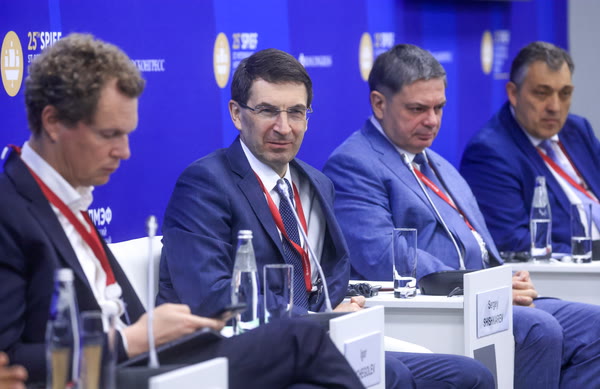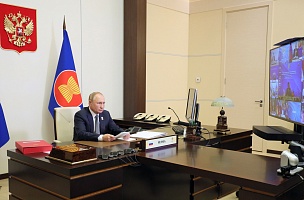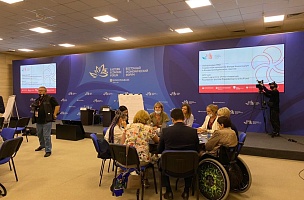Key conclusions
Russia is developing its own criteria for assessing the interaction between business and government
“We have developed an agenda concept that we called the EHS (Ecology, Human Resources, State). It is designed to determine the company’s degree of health and could help both society and the state evaluate to a degree the quality of said company based on the assessment, and base the cooperation with the company on that assessment. <...> The assessment of these three factors and a rating system could become a foundation for a new quality of relations between companies and the state. They can come down not only to certain penalties, which we use as a whip to force companies to comply with certain rules, but also to the so-called positive discrimination, when companies with a higher rating have certain advantages in relations with the state,” Igor Shchegolev, Presidential Plenipotentiary Envoy to the Central Federal District.
“This approach is a transformation of global themes, approaches to Russian conditions. Of course, as part of the EHS concept it is necessary to specify the requirements for socially responsible business, bringing them to specific indicators. As a result, we must have specific indicators that a socially responsible company must comply with in order to achieve long-term sustainable development goals together with the state. And we should think what kind of incentives such company should receive from the state,” Stanislav Prokofiev, Rector, Financial University under the Government of the Russian Federation.
Non-standard economic situations require non-trivial decisions of government and business
“Sometimes there is a temptation to invest in projects that are probably not the most promising and not the most advanced, with low salaries and with jobs that will be taken by an influx of migrants. It is clear that this is not quite what we need. Now, when the demand for these investments is higher than ever… it is important that these investments are of a high quality. And quality should not always be determined by purely economic indicators,” Igor Shchegolev, Presidential Plenipotentiary Envoy to the Central Federal District.
“What do we want to achieve by checking how our national projects work? The tax office starts an on-site audit, blocks accounts, charges additional taxes, collects those taxes. Then colleagues from the Ministry of the Interior join us, they completely block the work of the company, and arrest its property. Excellent job was done by all of us at all stages, but the question is what happened to the project. Where is the project? <...> The question is if we can develop a system that will allow us to see the risks, the hypothesis that in the future this or that legislation may be violated and nothing will be built,” Daniil Egorov, Head, Federal Tax Service of Russia.
PROBLEMS
The demographic situation in Russia has a direct and not always positive impact on the economic development
“Despite the fact that the district is growing in absolute terms [the population in the regions of the Central Federal District. – Ed.], most of the growth is achieved by moving people from other regions, the population itself is not growing. Unfortunately, this trend is not new, and it is already quite stable. Of course, we are also thinking about how to reverse this trend, because if we don’t grow in number, then what is the point of trying to develop our economy in the end… Despite any technology, the size of the population has a serious impact – this is both the size of the market and the potential for development. Therefore, the larger the population, the greater the power of the macro-region or state,” Igor Shchegolev, Presidential Plenipotentiary Envoy to the Central Federal District.
“We conducted a survey within the company and realized that 90% of the group's employees do not really understand what benefits and what mechanisms of state support currently exist to promote birth rate, support motherhood and childhood. We have established the position of a social manager in each of the sub-holding companies of the corporation. This person explains to employees what benefits they can receive from the state while increasing the country’s birth rate,” Sergey Shishkarev, Chairman of the Board of Directors, Delo Group of Companies.
Russia does not have its own environmental agenda that is not imposed by the West
“Our scientists saw two completely different ESG agendas, based on the experience of applying this concept in various countries. One is for external use – a very clear protectionist policy in which rich countries intend to receive part of the natural rent from countries that supply them with useful minerals or energy sources.<…> It seems that even if large-scale sanctions had not been imposed on our country, they would have come to us anyway, but under the flag of the ESG agenda,” Stanislav Prokofiev, Rector, Financial University under the Government of the Russian Federation.
“The ESG agenda emerged as an attempt of developing countries to redistribute rental income from resource-rich countries in their favour. Besides, it is trying to impose values that directly contradict those in our Constitution. Therefore, we probably should not follow the ESG agenda completely. And we are thinking of how to form our own agenda based on those principles and approaches of the ESG agenda that are close to us,” Igor Shchegolev, Presidential Plenipotentiary Envoy to the Central Federal District.
SOLUTIONS
Strengthening interaction between the state and business in solving social problems
“The development goals outlined in the decrees of the President [of Russia Vladimir Putin. – Ed.], cannot be achieved only by the efforts of the state. It is clear that certain efforts must also be made on the part of business. <...> It is not even the absolute numbers that this or that company will operate that are important, it is important that it becomes fashionable to have many children, and that our citizens understand that not only the state welcomes this, but there are also employers who believe that this is right and are ready to support it,” Igor Shchegolev, Presidential Plenipotentiary Envoy to the Central Federal District.
“Businesses today have a constant need for personnel. And the more comfortable a particular settlement is, the more likely it is that people who are ready to work will go to this point. <...> We are building recreation centres, first aid stations, hospitals, sports facilities, so that a private investor can make a profit. <…> It is difficult today to persuade people to become socially responsible,” Igor Artamonov, Governor of the Lipetsk Region.
It is more effective to motivate businesses in solving long-term problems than to threaten with punishment
“We care about how our region develops, and here everything is formed on trust... Business and government have an open dialogue; and it is really nice when you first get asked if you need help, and only after that you are invited to take part in some social programmes,” Andrey Kanunnikov, Chairman of the Strategic Committee, "Kursk Electric Equipment Plant"(JSC "KEAZ").
“When we saw companies that are at serious risk, we decided to try to conduct interviews with these companies. We told them about the risks, and recommended to correct some mistakes in order to finish the project and reach a high-quality result... Today, we can say that... by adjusting and fixing their mistakes at an early stage, 108 contracts have already been completed, this is RUB 8 billion. Not a single company went bankrupt, people continue to work and implement projects that they can be proud of later,” Daniil Egorov, Head, Federal Tax Service of Russia.
For more information, visit the Roscongress Foundation’s Information and Analytical System at roscongress.org/en






